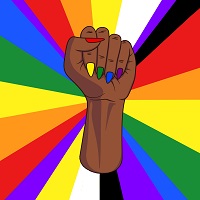Rap is regularly attacked as a sexist and homophobic genre. The bigotry in rap is itself presented as the product of the “savagery” of mostly racialized rappers who would be incapable of questioning their own stereotypes. Although international hip hop studies (Hammou, Rose, Li) have insisted that rap, like other cultural forms, reflects power dynamics and gender stereotypes that permeate Western societies as a whole, it is still difficult to make such arguments heard, when the voices of LGBT+ rappers remain relatively confidential (Weaver). However, the explosion of the openly gay rapper Lil Nas X in 2019 (nearly 50 million monthly listeners on Spotify) seems to be an undeniable proof of the iconoclastic power of this culture born, as the story has it, in the Bronx in 1973 (Chang). The more modest but nonetheless impressive rise of the lesbian rapper, Young M.A. (22 years old and more than 3 million monthly listeners on the same platform) seems to confirm the observation. However, a detailed analysis of her lyrics, her musical aesthetics, her interviews, and the gender representations in her videos paints a much more complex picture. The rapper titles her 2019 debut album “Herstory in the making”, while refusing the labels of “lesbian” or “female rapper”. She seems to adopt all the codes of a toxic masculinity that have been observed at one time or another in cis-gender rappers like Snoop Dogg, Dr Dre, or Sir-Mix-A-Lot, while never hiding her desire for other women. How do we explain these biases in this young artist's gender representation? Is she, as hip-hop feminists like Gwendolyn Pough proposes, pulverizing preconceived notions about (“bringing wreck to”) gender and “race” while making herself visible? Or is she hesitating between questioning norms and adhering to them? Would she change her position after a discussion with the “mother” of hip hop feminism, Joan Morgan, author of When Chickenheads Come Home to Roost: A Hip hop Feminist Breaks it Down (1999)? Is she giving in to politics of respectability (Higginbotham) that is specific to hip hop (Li)? How can the study itself of various hip-hop forms in schools (Kim and Pulido, Love, Souyri) help to pulverize preconceived ideas about the legitimacy of knowledge, the norms of representation of Black (and more broadly racialized) and LGBT+ identity, in the U.S. as in France? These are some of the questions I will try to answer in this presentation.
Hammou, Karim. 2018. « Rap en France et racialisation ». Mouvements : des idées et des luttes, interview par P. Simon, 96 (4): 29. https://doi.org/10.3917/mouv.096.0029.
Higginbotham, Evelyn Brooks. 1993. Righteous discontent: the women's movement in the Black Baptist Church, 1880-1920. Cambridge, Mass., Etats-Unis d'Amérique: Harvard University Press.
Kim, J., et I. Pulido. 2015. « Examining Hip-Hop as Culturally Relevant Pedagogy ». Journal of Curriculum and Pedagogy 12: 17‑35. https://doi.org/10.1080/15505170.2015.1008077.
Li, Xinling. 2019. Black masculinity and hip-hop music: black gay men who rap. Singapore, Singapour: Palgrave Macmillan.
Love, Bettina L. 2012. Hip Hop's Li'l Sistas Speak: Negotiating Hip Hop Identities and Politics in the New South in Counterpoints 399: 16‑31.
Love, Bettina L. 2015. « What Is Hip-Hop-Based Education Doing in Nice Fields Such as Early Childhood and Elementary Education? » Urban Education 50 (1): 106‑31.
Morgan, Joan. 1999. When chickenheads come home to roost: my life as a hip-hop feminist. New York, Etats-Unis d'Amérique: Simon & Schuster.
Pough, Gwendolyn D. 2004. Check It While I Wreck It: Black Womanhood, Hip-Hop Culture, and the Public Sphere / Gwendolyn D. Pough. Boston: Northeastern University Press.
Rose, Tricia. 2008. The hip hop wars: what we talk about when we talk about hip hop--and why it matters. New York, Etats-Unis d'Amérique: BasicCivitas.
Souyri, Emilie. 2022 (à paraître). « Pour une pédagogie hip hop en France », dans L'École à travers la culture pop. Edité par Antoine De Robertmasure, Ed Mardaga.
Weaver, Jackson. 2021. « Lil Nas X, DaBaby and the question of homophobia in hip hop ». CBC Canada, 7 août 2021. https://www.cbc.ca/news/entertainment/lil-nas-x-dababy-changing-hiphop-1.6132742.

 PDF version
PDF version
